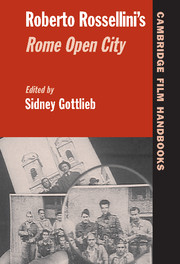Book contents
- Frontmatter
- Contents
- Acknowledgments
- List of Contributors
- Introduction: Open City: Reappropriating the Old, Making the New
- 1 Rossellini, Open City, and Neorealism
- 2 The Making of Roma città aperta: The Legacy of Fascism and the Birth of Neorealism
- 3 Celluloide and the Palimpsest of Cinematic Memory: Carlo Lizzani's Film of the Story Behind Open City
- 4 Diverting Clichés: Femininity, Masculinity, Melodrama, and Neorealism in Open City
- 5 Space, Rhetoric, and the Divided City in Roma città aperta
- 6 Mourning, Melancholia, and the Popular Front: Roberto Rossellini's Beautiful Revolution
- REVIEWS OF OPEN CITY
- Filmography
- Select Bibliography
- Index
Introduction: Open City: Reappropriating the Old, Making the New
Published online by Cambridge University Press: 09 February 2010
- Frontmatter
- Contents
- Acknowledgments
- List of Contributors
- Introduction: Open City: Reappropriating the Old, Making the New
- 1 Rossellini, Open City, and Neorealism
- 2 The Making of Roma città aperta: The Legacy of Fascism and the Birth of Neorealism
- 3 Celluloide and the Palimpsest of Cinematic Memory: Carlo Lizzani's Film of the Story Behind Open City
- 4 Diverting Clichés: Femininity, Masculinity, Melodrama, and Neorealism in Open City
- 5 Space, Rhetoric, and the Divided City in Roma città aperta
- 6 Mourning, Melancholia, and the Popular Front: Roberto Rossellini's Beautiful Revolution
- REVIEWS OF OPEN CITY
- Filmography
- Select Bibliography
- Index
Summary
Like only a handful of other works – Birth of a Nation (1914), Potemkin (1925), Citizen Kane (1941), and Breathless (1960) come most readily to mind – Roberto Rossellini's Roma città aperta (1945; hereafter referred to in my essay simply as Open City) instantly, markedly, and permanently changed the landscape of film history. It has been credited with helping to initiate and guide a revolution in and reivention of modern cinema, bold claims that are substantiated when we examine its enormous impact, even to this day, on how films are conceptualized, made, structured, theorized, circulated, and viewed. But the film has attained such a mythic power and status that we must be careful not to give in to uncritical enthusiasm. To combat this tendency (as well as to analyze and celebrate the film's perpetual appeal)the present volume is designed as “revisionary,” offering a fresh look at the production history of Open City; some of its key imag(particularly its representation of the city and various types of women); its cinematic influences and influence on later films; the complexity of its political dimensions (including the film's vision of political struggle and the political uses to which the film was put); and the legacy of the film in public consciousness.
Occasionally the effect – and, in fact, the intention – of this reexamination is to demythologize certain aspects of the film and the legends that surround it. For example, several of the essays herein note the various ways that Open City bears many traces of the kind.
- Type
- Chapter
- Information
- Roberto Rossellini's Rome Open City , pp. 1 - 30Publisher: Cambridge University PressPrint publication year: 2004
- 1
- Cited by



